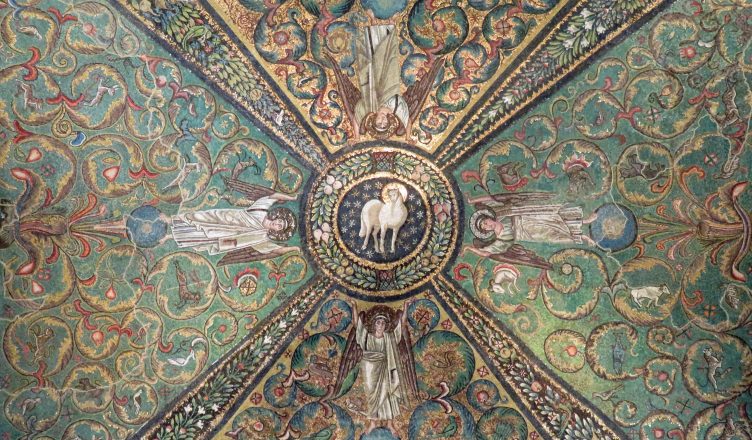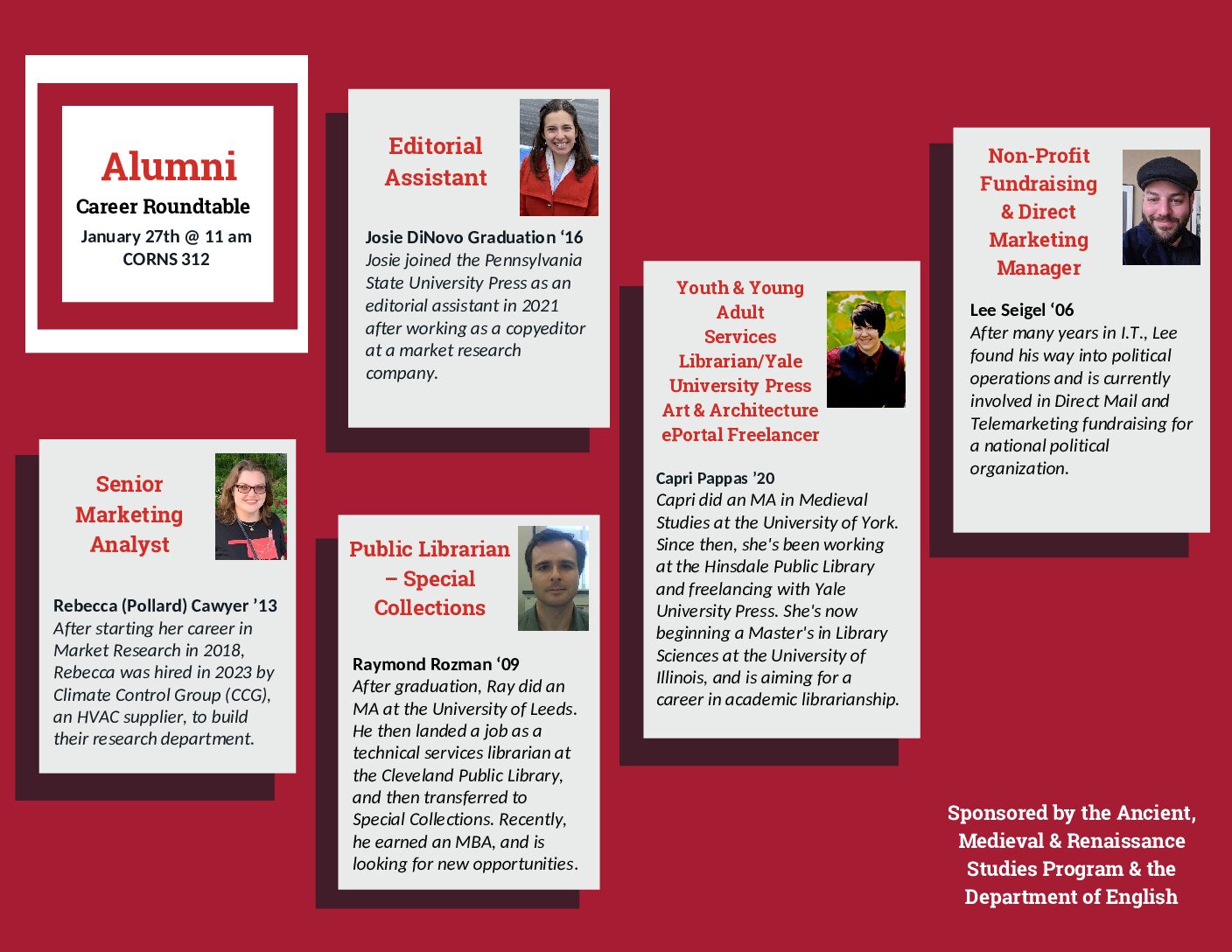We were all sad to see Dr. Ellen Arnold, our previous medieval history professor, leave us this past semester. Despite this loss, students of medieval and renaissance history have plenty to look forward to as Dr. Hysell takes over the position this fall. A former OWU alumni, Dr. Hysell earned his BA in History here at Ohio Wesleyan University, and now has returned to his alma mater to join OWU from the faculty side. I had the opportunity to interview Dr. Hysell about his past experiences with OWU, and what he’ll be bringing to his history classes today.
What brought you to OWU and studying history as an undergraduate?
Dr. Hysell took AP courses in high school and developed an interest in pursuing history, and from there, he knew he could go into graduate school, law school, or take other paths. The first time he walked into Elliott Hall made a big impression on him, and taking the upper level seminars and exploring “complex and vexing questions in history” got him hooked. By senior year, he determined he wanted to continue his education in graduate studies, and because of his foreign language background, decided on European history.
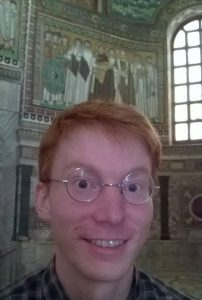
Contrary to popular belief, Dr. Hysell has proven that you can graduate with a liberal arts undergraduate degree and indeed leave school with a career. He worked as an office historian for the Delaware Sheriff’s Office — researching and compiling aural and written information on the past sheriffs in the department to create portraits and biographies — all while still a student. His compilation of the biographies can be found here: https://sheriff.co.delaware.oh.us/wp-content/uploads/sites/6/2019/04/History-of-the-DCSO-2019V.pdf. After graduation, he left school with a full time job at Nationwide as well, showing the practical application of a liberal arts degree outside of graduate studies and even the directly related fields of work.
Returning to OWU as a former student means that the position isn’t an “entirely new ‘new job,’” as Dr. Hysell has already gotten to know the school and its environment from his position as a student in the past.
How did OWU prepare you for graduate study?
When he began studying history, he assumed the core work would be in studying and getting to know a breadth of past events and time periods. As Dr. Hysell entered upper level classes for his degree, he began to make the transition from learning about history to the study of historiography, where he delved into the ‘history of history.’ In historiography, you study the meta level of what historians do, and Dr. Hysell was intrigued by the “complexity of the past.”
In the transition from studying past events to working on his capstone project and studying historiography, Dr. Hysell learned that “the past is a malleable thing, and history is constantly being used to serve the present.” One example that has come under fire in recent years has been the treatment of Christopher Columbus in America. During the nineteenth century, Columbus was branded as having ‘discovered America’ and honored as such by Italian Americans. This incorrect portrayal of Columbus as an American pioneer and hero has lasted until recent years, and has been perpetuated by American education.
“The past is a malleable thing, and history is constantly being used to serve the present.”
Today, Columbus has fallen from grace in the eyes of America, and rather than a hero he is now presented as a villain who enabled the drive of the American slave trade and suffering of the Native Americans. This debate of heritage, national heroes, and the destruction of cultures begs the question, “whose history, whose past, is being represented?” Columbus would barely have identified himself as ‘Italian’ in a time when such a geographical term didn’t exist, he never actually set foot in North America, and Columbus insisted that the Caribbean was simply a part of Asia. He’s hardly a representation of an Italian explorer, or of someone who discovered the Americas. Now debates are hot about what Columbus represents, and whether he should be honored with a holiday and have statues in places like Syracuse, and especially in a town like Columbus that’s literally named after someone once hailed as a hero.
This also illustrated another key concept Dr. Hysell learned; there is no unbiased understanding of the past. Whether positive or negative, everyone views events from their own perspective, and part of his training was to observe his own biases. Anyone can take a past event and interpret it in a way that benefits them in their own goals and perspective.
Another part of his studies was looking at how to take past events and make them relevant to the present. By studying what’s happened in the past, “it can give a better sense of the problems of the world today, making teaching history really valuable.” Looking at the impact of events like the Black Death, a plague that swept across Europe, can help us understand how we today are reacting to our own global pandemic economically, sociologically, and in many other aspects.
Do you have any advice for students, especially those in AMRS and history?
“The first piece that comes to mind: take foreign languages and take them seriously.” For students looking at graduate school, languages from Latin and Greek to modern foreign languages will serve your studies later on.”
“Continue to think creatively and flexibly of what a liberal arts education can do, and never feel wedded to graduate school or pursuing a direct career.”
A liberal arts degree shapes basic life skills; crafting arguments, communicating effectively, writing a good cover letter, and more. “Don’t discount the value of education, but don’t feel constrained by it.” He stressed that a degree in history or medieval studies does not marry you to that field, while it also provides a wonderful opportunity for higher education and studies in it if you choose to continue on.
What are your favorite areas to explore in the classroom?
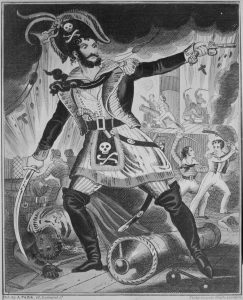
Dr. Hysell’ s area of specialization lies on the border between the medieval and modern/Renaissance eras. His favorite topics are in social history, especially “how groups of people have interacted over time, ethnic interaction, and cross cultural interaction.”
In the past, his course on pirates explored how the underprivileged make sense of the world. He also enjoys looking at food history, as food has served as gifts and communication between cultures, ritual practices and uses of food and drink, and exchanges like the Spice Trade.
What courses will you be offering this year?
His British History class, Hist 262, will be taking a close look at history through food, and more specifically, the history of cheese in Britain. One of the texts will be A Cheese-Monger’s History of the British Isles by Ned Palmer, the history of Britain followed through the development of cheese. It begins with the Neolithic era, looking at shepherds and the goat cheese they produced through keeping livestock, to the Romans, to medieval monks, to market forces of the 14th-16th centuries, to the cheese of the modern period.
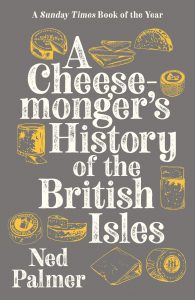
This study will of course include more hands-on experiences, and hopefully Covid-allowing, will include the tasting of cheeses and spices from these periods. He’ll also be offering Hist 346 on Renaissance Europe, and Hist 111 on Introduction to Medieval Study.
In the spring semester, he’ll likely be offering the student-favorite Black Death and plagues course, studying the impact of disease on Europe. He knows that Dr. Arnold’s class has left big shoes to fill, but he hopes to deliver something comparable. Some of the topics of discussion will be on how the rapid vanishing of the population had social and economic repercussions, leading to effects like higher demand for labor, higher wages, and improved living conditions, surprising “benefits for lower strata of society.” The more negative aspects will include the tragedy of such loss of life, including the gruesome aspects, the impact on attitudes towards the church, the effect on medicine, and how it shaped society at large.
Today, we’ve seen how a seemingly inconsequential animal like a bat in Wuhan, China can impact all of society. The influence animals have had on humans, especially as carriers of diseases like the plagues in Europe, has shaped human history. This raises some intriguing questions; “Can animals have historical agency? What is the relationship between humans and animals, and to what extent are we not as in control as we think we are? How does this relate to our current pandemic?” These are questions that clearly have impacted our society in the last two years with Covid-19, and provide a prime example of how the past is relevant to today.
So if you’re taking one of his history courses this fall, or are in need of a history credit to fulfill your degree requirements and want a fun course — that will include eating cheese– you know Dr. Hysell’ s history courses will be the perfect option for a fun and unique engagement with the past.
